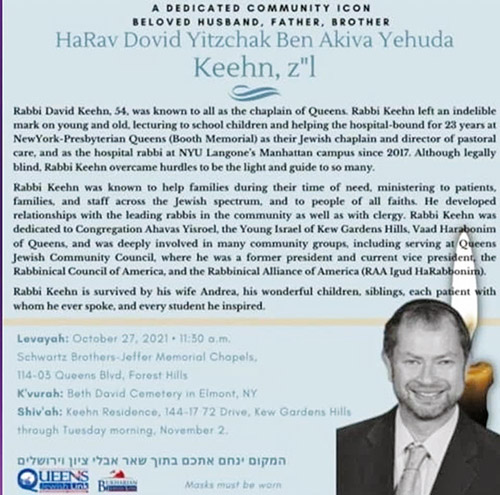
Recently, I heard news that stunned me into silence: the untimely passing of a fellow chaplain, Rabbi David Keehn, z”l. Only 54 years old at the time of his sudden death, he had been a chaplain at NYU Langone Hospital in New York City since 2017, after serving for 23 years as Jewish chaplain and director of pastoral care at NewYork-Presbyterian Hospital in Queens. My colleague and friend for over 25 years, he was both a dedicated chaplain and the most unassuming of human beings.
Years ago, he and I returned to our respective alma matter of Yeshiva University to give a talk about chaplaincy to the semicha students, and one thing he told our audience was “Twenty years from now, no one will remember your Pesach HaGadol drasha, but they will remember that you were there when Mom died.”
His goal was not to tell anyone planning on going into the pulpit or education to change plans, but to make the salient point of how, within the realm of pastoral care, there are crucial moments where one’s actions, especially one’s physical presence itself, can leave an indelible impression that will be forever appreciated by the recipient. Conversely, a blunder in this area at these delicate moments, even if it is unintentional, may result in a rift that might never be mended.
It was almost eerie to me that he passed away just one day before what would have been my mother’s birthday and only a few days prior to her 12th yahrzeit as I recall his sagacious sentence. How that line resonates with me not only from a professional standpoint but from a personal one as well. Looking back on the aftermath of my mother’s departure from this world, I did not have enough thanks to give to all those who reached out to me, including those who called me or sent cards or emails, but especially those who arrived in person to perform the mitzvah of nahum availim, or offering solace to mourners.
Perhaps I can pay tribute to my friend by parlaying his advice into strategy. Sadly, inevitably, part of our journey through this life will be losing others, and it behooves us to reach out to those who now have to cope with the loss. First of all, if you have the chance, by all means try to join the mourner(s) in person.
Recall that it is for the mourner to initiate the conversation. Also keep in mind that this person is dealing with a life-altering traumatic experience, and of course how each person reacts to and deals with it may vary. If you knew or had a relationship with the deceased, and can share a positive vignette, that is appropriate and will likely be appreciated. But you do not need to say much or entertain; often your presence and genuine expression of concern will communicate far more than you can possibly articulate.
And if you can’t come in person, a phone call, text or, in some cases, even a “Zoom” connection is certainly a positive thing to do. Ditto for emails and the tried-and-true sympathy card.
The point is that you showed concern and acknowledgment of this person’s predicament. Quite recently, I was in a non-chaplaincy situation, and some person greeted me and thanked me very warmly with, “It meant so much to me when you said a prayer for my dying parent in the hospital.” This had occurred many years earlier and the truth is I did not recognize this person or recall having done this; of course as a chaplain I visit and interact with so many people and it is very difficult to recall each interaction. But it perfectly illustrates my fellow chaplain’s insight:
“Twenty years from now, no one will remember your Pesach HaGadol drasha, but they will remember that you were there when Mom died.”
Rabbi David Keehn, thank you for being such a great chaplain and caring person. I, and certainly many others, will not forget you.
Rabbi David Blum provides pastoral care throughout New Jersey as part of the Rabbi Chaim Yosef Furst Chaplaincy Program, which is conducted via Congregation Ohav Emeth of Highland Park, and the Joint Chaplaincy Program of the Jewish Federation of Greater Metrowest. He resides with his family in Highland Park and may be contacted at [email protected].













